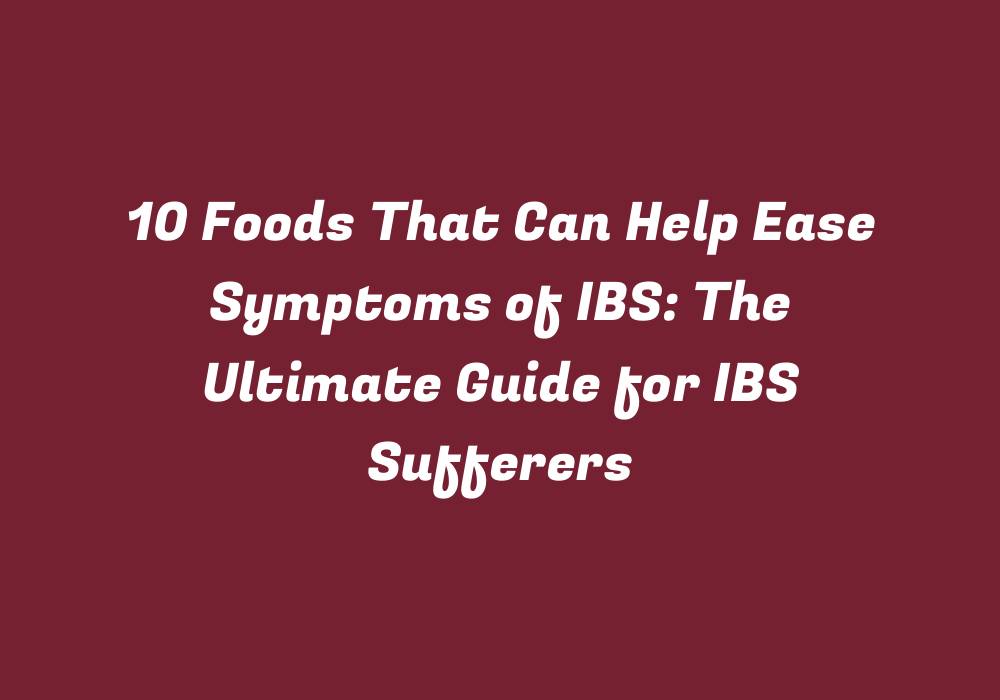Introduction: A Comprehensive Guide to Foods that Help Ease IBS Symptoms
Irritable Bowel Syndrome (IBS) is a complex disorder affecting millions of people worldwide. It involves various gastrointestinal symptoms, including abdominal pain, bloating, constipation or diarrhea, and cramping. While there’s no universally effective treatment for IBS, making dietary modifications can have significant impacts on easing these symptoms. In this article, we will delve into the top 10 foods that can help alleviate some of the most common discomforts associated with IBS.
1. Whole Grains
Including whole grains in your diet is an essential step for managing IBS, as they are known to improve gastrointestinal function and provide a wide range of health benefits. Opting for whole grain foods such as brown rice, quinoa, oats, or whole wheat bread can help regulate bowel movements and alleviate constipation in some individuals with IBS. Additionally, these fiber-rich alternatives may also reduce the risk of developing colon cancer by increasing regularity and promoting a healthy digestive tract.
2. Probiotic Foods
Probiotics are beneficial bacteria that promote gut health and overall wellbeing. Consuming foods rich in probiotics, such as fermented vegetables like sauerkraut, kimchi, and pickles, can help restore the balance of good bacteria within the digestive system. This can lead to a reduction in abdominal pain, bloating, and other symptoms often experienced by IBS sufferers. Additionally, probiotic supplements may also be considered for improving gastrointestinal health if needed.
3. Fruits and Vegetables
Incorporating a variety of fruits and vegetables into your daily meals is not only vital for overall health but also plays a crucial role in managing IBS symptoms. High-fiber foods, such as apples, pears, berries, leafy greens, and root vegetables like sweet potatoes, can help regulate bowel movements and alleviate constipation. Furthermore, these nutrient-dense options offer an array of vitamins, minerals, and antioxidants that contribute to a healthier gut environment and improved overall digestive function.
4. Lean Protein Sources
Although the impact of protein on IBS varies from person to person, selecting leaner options such as chicken breast, fish, or tofu can help minimize gastrointestinal distress. Avoiding high-fat meats like red meat and processed foods may also reduce instances of bloating, gas, and abdominal pain. By incorporating healthier protein sources into your diet, you can support gut function while still obtaining essential nutrients necessary for a well-balanced meal plan.
5. Legumes
Beans and lentils are an excellent source of soluble fiber and various nutrients that can help with digestion issues related to IBS. The high fiber content found in legumes promotes regularity, reducing the risk of constipation or diarrhea, while their natural ability to absorb water makes them filling yet easy on the stomach. Incorporating these nutritious foods into your diet can positively impact gastrointestinal health and alleviate IBS symptoms.
6. Healthy Fats
Although fat is essential for a well-balanced diet, it’s crucial to select healthier options that won’t aggravate IBS symptoms. Omega-3 fats found in oily fish like salmon or walnuts can help alleviate gastrointestinal inflammation and improve overall digestive function. In contrast, avoiding high-fat dairy products may reduce the risk of bloating and gas, as these can be difficult to digest for those with IBS.
7. Herbs and Spices
Including herbs and spices in your meals can provide a variety of health benefits while also promoting gastrointestinal wellbeing. Ginger is known for its ability to soothe nausea, stomach discomfort, and bloating, making it an ideal addition to IBS-friendly diets. Other beneficial herbs and spices include turmeric, which can reduce inflammation in the gut, and peppermint, which has been used traditionally for its ability to alleviate bloating and abdominal discomfort.
8. Low FODMAP Foods
For some people with IBS, a low-FODMAP diet may be beneficial in managing symptoms by reducing gas production and overall digestive distress. FODMAP refers to Fermentable Oligo-, Di-, Mono-saccharides And Polyols, which are types of carbohydrates that can cause gas buildup and diarrhea when not adequately digested. By excluding high FODMAP foods like certain fruits and vegetables, dairy products, or sugary treats from your diet, you may experience improved IBS symptoms.
9. Stay Hydrated
Ensuring proper hydration is crucial for overall health but can also help alleviate IBS-related discomforts. Drinking water throughout the day and staying well-hydrated can promote regular bowel movements, improve digestion, and reduce constipation symptoms associated with IBS. In addition to plain water, consuming herbal teas like ginger or peppermint can also offer soothing benefits for those living with IBS.
10. Avoid Trigger Foods
Lastly, understanding and avoiding trigger foods that exacerbate IBS symptoms is essential to managing the condition effectively. Common culprits include caffeine, alcohol, dairy products, processed foods, or highly spicy dishes. By keeping a food diary and tracking which foods cause discomfort, you can better tailor your diet for optimal gastrointestinal health.
In conclusion, making simple yet strategic changes to your diet can significantly impact the management of IBS symptoms. By incorporating whole grains, probiotic-rich foods, fresh fruits and vegetables, lean protein sources, legumes, healthy fats, herbs and spices, low FODMAP options, adequate hydration, and trigger avoidance into your daily meals, you can improve gastrointestinal health while still enjoying a well-rounded diet. Consult with your healthcare professional for personalized guidance on managing IBS through nutritional adjustments.
